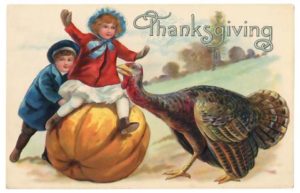
Here on Thanksgiving Day, I find myself thinking about the role of “traditions” in our lives. As many will explain, traditions commonly engender a sense of comfort, belonging, and connection with others. Traditions help to carry and convey our shared stories, thus imprinting on us from a very early age what those stories are, what our shared values are, how we are to be – with one another and with life in general.
As most of us have come to understand it, our story of Thanksgiving marks the arrival and establishment of English settlers in “the new world.” Images and tales of pilgrims and “Indians”, feasts of roast turkey, pumpkin pie, and corn pudding – have carried that story down through generations of Americans creating family bonds and settling into the very familiar traditions that have come to define what it is to be “American.” And with the help of some healthy commercialism, the tradition has, over time, spread and become the commonly celebrated holiday that neatly tides over between Halloween and Christmas, Hanukkah, Kwanzaa, and a few other December holidays thus sustaining an economic boon season.
It may be of interest and surprise to many to learn that the true origins of our national Thanksgiving Day “have little to do with the Pilgrims and the Indians, and everything to do with the American triumph against slavery.”
Like most stories, one’s experience of the Thanksgiving tradition depends on one’s perspective of the story. For many Indigenous people, Thanksgiving is a time of mourning and remembrance of the complete upheaval, the many tragedies, and the enduring injustices of a brutal foreign settlement.
Just like we’re wired for storytelling, we’re similarly wired for valuing the traditions that convey our stories. We all know the powerful feelings we have around beloved traditions. But while traditions play such an important role in creating social bonding, they can also create conflict when they fail to reflect the complex and evolving character of a society. When that happens, traditions need to adapt. The focus of the Thanksgiving story is gradually shifting away from a contrived view of grateful pilgrims and happy Indians to a focus on uniting family and friends with a general message of thankfulness. But its deep roots in the contrived story still foster a skewed version of who we are and where we came from.
And for some the Thanksgiving tradition of gathering presents challenges. For those who haven’t developed the “art of disagreeing agreeably”, deep divisions in politics and other beliefs often create conflict that separates rather than unites family members. A practice of respectful conversation on meaningful topics can allow deeper connections and understandings to develop among family members culturally separated by a rapidly changing world.
And those mindful of avoiding harm to animals struggle to find a place at the traditional Thanksgiving table bereft of an awareness and compassion for the sentient creatures at the centerpiece. The traditional celebration centered around a roast turkey feast began when access to food and sustenance was very different, when the successful kill of a wild turkey required patience, thought, skill, and a connection with the natural world. But that’s a far cry from our current practices of factory farming and long lines awaiting our frozen neatly denuded and packaged birds – a practice that conveniently separates our mind and heart from the miserable lives of the creatures we consume, discard, and belittle.
If we want to live by stories that bridge our divides and carry us forward as a compassionate species, we’ll need to rethink and broaden our stories and our traditions. We’ll need to loosen our tight grasp and invite the change that can embrace new values that are inclusive rather than exclusive. That will require us to think critically about something that we largely hold (and hold dearly) outside of our rational brains. It will require us to bring our beliefs and values into our rational consciousness, to gently explore them, question them, and allow our compassionate reason to assure our emotional beings that it can best serve us by allowing us to shift and embrace change.